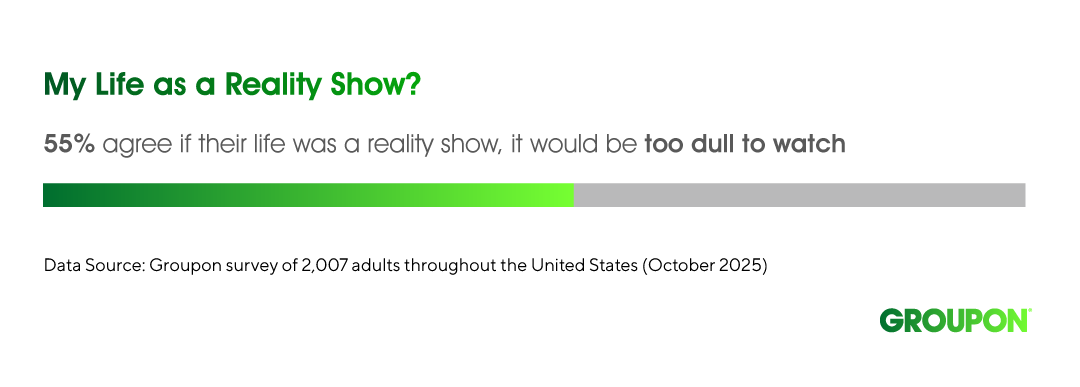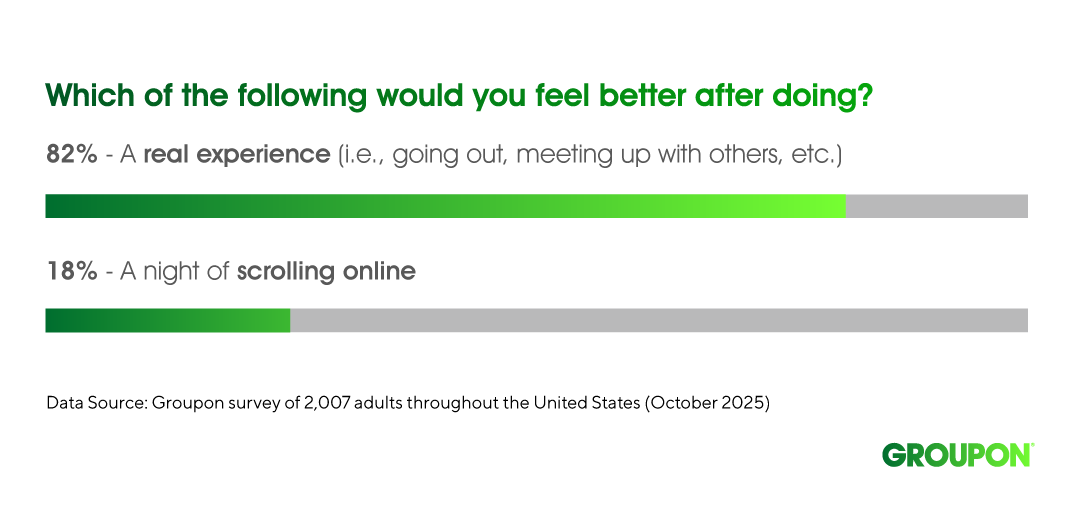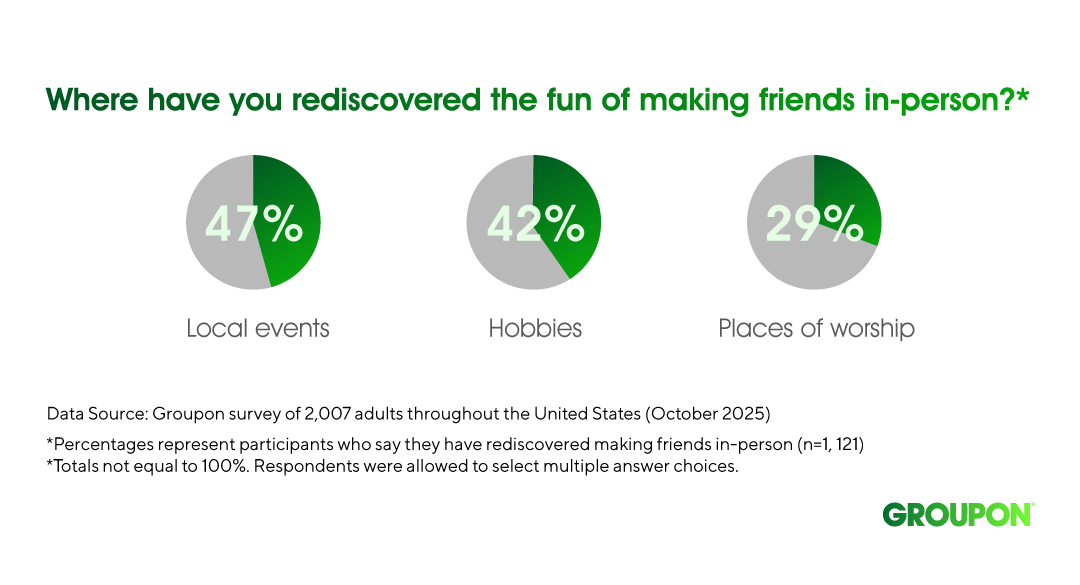The Rut Report 2025
How America Got Stuck On Repeat - And How to Turn Life Back On
Executive Summary
Americans today are facing what might be called a “fun recession.” According to Groupon’s national survey, roughly 62% of U.S. adults say their daily lives feel repetitive, while 55% say their lives would be too boring to watch if they were a reality TV show. Underpinning this pattern are multiple converging pressures: cost-of-living increases, time and planning burdens, digital saturation, and shrinking access to new experiences. Yet the desire to reconnect, to break free of routine, to re-discover local life remains strong. At Groupon, we believe fun shouldn’t be a luxury line item. Life gets better when discovery is easy, local, and affordable.
Key findings at a glance:
- 62% say their daily life feels repetitive
- 55% reveal their life would be too dull to watch as a show
- 53% indicate that making social plans feels like scheduling a work meeting
- 54% say cost keeps them from trying new experiences
- 82% say they feel better after a real experience than after scrolling online
- 51% say they spend more time talking about experiences than doing them
- 56% say they’ve rediscovered making new friends in person
- 38% say they’ve checked a bucket-list experience this year
In the pages that follow, we unpack these findings in four major themes: Routine Fatigue, Cost and Logistics Barriers, Digital vs Real Life, and the Comeback of Connection & Experience. In each we tie our data to broader research, offer commentary, and surface implications for brands, communities, and individuals seeking “turn-life-on” moments.
Life on Repeat - The Routine Fatigue
When every day blurs together, the brain hits autopilot. We found that 62% of U.S. adults say their day-to-day life feels repetitive. More than half of respondents (55%) say their life, if it were a reality show, wouldn’t be interesting enough to watch. And 53% feel the act of planning fun now has to be done like a work meeting.
Recent U.S. research on monotony and mental health shows that long stretches of sameness can heighten stress and dull memory formation (National Library of Medicine, 2023). Add in hours of passive scrolling, and our internal highlight reels start to fade.
“Novelty doesn’t have to be big. With 62% of people saying their days feel repetitive, even small shifts - trying something new, saying yes to that invite from a friend - can break the pattern. And it works, 82% of Americans tell us a real experience lifts their mood more than spending time online." Josef Buryan, CMO, Groupon.
Our survey data show the desire for that break is widespread - but the path to it is opaque for many.
The Price of Play - Cost & Access Barriers
More than half (54%) of Americans say price keeps them home, while half say they’d be more spontaneous if life demanded fewer competing obligations.
U.S. data back that up: the Labor Institute for Social & Economic Policy (LISEP) found that the cost of basic recreation has jumped 38% since 2001. The Bureau of Labor Statistics’ American Time Use Survey shows that since 2019, leisure time has declined most among working adults. And transport and “time poverty” now rank as major barriers to participation (Journal of Transport Geography, 2024).
The takeaway: people aren’t rejecting fun - they’re priced and planned out of it. When a night out requires budget math, rideshare juggling, and childcare logistics, joy starts to feel like a job.
“Our Belief: Joy shouldn’t need a spreadsheet. When you lower the barriers - cost, time, or indecision - people don’t just have more fun; they live more life. That’s the problem we’re built to solve.” says Buryan.
Planning Fatigue & Digital vs Real Life
We talk about fun more than we actually do it - and the screen often wins. Our survey shows that 53% agree that making social plans feels like scheduling a work meeting. 51% say they spend more time talking about fun than actually doing it. Yet a huge 82% say they feel better after a real-world experience than after scrolling online.
Research on leisure crafting - intentionally planning restorative time - shows that when screen time dominates and physical or social leisure drops, emotional exhaustion rises (Stress & Health Journal, 2024).
“Scrolling is easy; deciding is hard,” says Emma Coleman, VP Communication, Engagement & Inclusion, Groupon. “Technology should remove decisions, not add them - turning a ‘should we?’ into a ‘let’s go!’ in one tap.”
The Friendship Comeback & Experience Economy
Connection, small experiments and local discovery are making a return. Our research shows that 56% of respondents say they’ve made new friends in person this year. Among those who share they rediscovered the fun of making new friends in-person, local events (47%) and shared hobbies (42%) were common entry points. Notably, bars (27%) ranked lower than other avenues of connection. Additionally, 38% of respondents say they’ve done a bucket-list experience this year - with Gen Z (47%) and Millennials (47%) leading.
That aligns with findings from UCLA’s Friendship Research Lab and the American Time Use Survey, which show that time spent on shared experiences is one of the strongest predictors of happiness and emotional resilience.
“Friendship is officially fun again,” Coleman says. “It’s less about big nights out, more about small shared adventures - from trivia nights to trail hikes. Connection × novelty × low friction = maximum joy.”
City Snapshots & Across-the-Board Trends
From New York’s calendar clutter to L.A.'s price tag pressure to Chicago’s seasonal slowdowns, each city has its own rut.
Our research found:
- New York: Craves connection but short on time
- Los Angeles: Adventure-minded but slowed by cost
- Chicago: Community-driven but constrained by weather and schedules
Urban mobility studies show that most Americans travel more than seven miles for recreation - meaning fun often feels far away. When it takes effort to get there, we put it off.
Our Belief: Local life is the secret to momentum. The antidote to routine is closer than you think - usually in your own zip code.
Turning Life Back On - The Call to Action
Despite the inertia, 38% of respondents say they’ve done a bucket-list (or “new-for-me”) experience this year. And younger generations (Gen Z: 47%; Millennials: 47%) are leading. That indicates impetus for change already exists.
“People don’t need luxury - they need accessible, fun for great value; experiences that delight and surprise! Groupon is well positioned to deliver that. For individuals: set a low-threshold experiment. Take a Pole Dancing Class with your bestie, treat your Mom to a great lunch out of the blue. Say “yes” once this month to something you haven’t done before. Invite a friend. Keep the cost and planning under a threshold you’re comfortable with. The goal: generate a story worth remembering rather than another chore.” Josef Buryan, CMO, Groupon.
Methodology
Number of Respondents: 3,508 respondents
Fielding Dates: Between October 23 and October 28, 2025
Sample Description: The survey consists of a nationally-representative sample of 2,007 adults throughout the United States. Demographic characteristics such as gender, age group and U.S. region are nationally representative of the overall U.S. population of adults. The margin of error for the sample of 2007 U.S adults is +/- 2 percentage points with a confidence level of 95%.
Additional sampling was conducted throughout the New York, Los Angeles and Chicago markets, with 500 adults sampled in New York, 501 adults sampled in Los Angeles and 500 adults sampled in Chicago. The margin of error for each of the three oversampled markets is +/- 4 percentage points with a confidence level of 95%.
About The Rut Report
The Rut Report is part of Groupon’s broader mission to help people rediscover local life - providing more reasons, more access, and more affordable ways to experience the neighbourhoods they live in and love. For press inquiries: press@groupon.com | More information: press.groupon.com
References
National Library of Medicine (2023)
Research on monotony, routine, and cognitive impact.
https://www.ncbi.nlm.nih.gov/pmc/articles/PMC10023487/
Labor Institute for Social & Economic Policy (LISEP)
Cost of recreation rising over time (“True Living Cost” analysis).
https://www.lisep.org/research
Bureau of Labor Statistics — American Time Use Survey
Leisure time decline among working adults since 2019.
https://www.bls.gov/tus/
Journal of Transport Geography (2024)
Time–space constraints and recreation access as participation barriers.
https://doi.org/10.1016/j.jtrangeo.2024.103888
Stress & Health Journal (2024)
Screen-heavy leisure linked to emotional exhaustion.
https://doi.org/10.1002/smi.3333
UCLA Friendship Research Lab
Shared experiences and social connection as predictors of happiness.
https://socialconnect.ucla.edu/research
Urban Mobility Studies — National Household Travel Survey
Average distance traveled for recreation (7+ miles).
https://nhts.ornl.gov/




